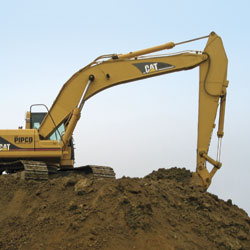
Despite a sluggish economy in the United States, the company remains committed to investing in major Illinois plants to keep them competitive for the long run.
Demonstrating confidence in its ability to compete globally from a strong U.S. manufacturing base, Caterpillar Inc. announced a multi-year $1 billion capacity expansion that will position key factories in Illinois and other areas to compete for the long term. The investments will allow Caterpillar to meet continued demand and bolster its applications. In support of this capacity expansion, the company will invest more than $1 billion from 2008 through 2010 in five existing facilities in Illinois (East Peoria, Joliet, Decatur, Aurora and Mossville).
“This is certainly very positive news for the Illinois communities where we operate as we invest today to strengthen our global leadership position in the industries we serve and to maintain our ability to profitably compete in the global economy,” said Caterpillar Chairman and CEO Jim Owens. “This restructuring and capital investment in critical North American operations demonstrates our optimism about the global markets we serve and Caterpillar’s long-term commitment to our employees, our customers and our stockholders.”
Investing for Growth
The major highlights of Caterpillar’s planned $1 billion capital investment plan include the following:
- Expenditures in East Peoria to increase capacity for track-type tractors, pipelayers and for off-highway transmissions
- Capacity expansion in Decatur to increase large off-highway truck production
- Capacity expansion in Aurora for increased production of wheel loaders and excavators
- Capacity expansion for increased production of service parts to support Caterpillar dealers and customers
- Investments in Joliet to increase component production capacity.
Strategic Direction for On-Highway Trucks and Engines
As previously announced, Caterpillar will not supply Environmental Protection Agency 2010 compliant engines to truck and other on-highway original equipment manufacturers. Today, those engines are primarily produced in Mossville, Illinois, and Greenville, South Carolina, where existing capacity for on-highway engines is far greater than what will be needed in the future. As a result of this strategic decision, Caterpillar is contemplating opening a new facility in a location to be determined where it would produce off-highway heavy-duty engines currently assembled in Mossville.
Restructuring for Long-Term Competitiveness
The company’s expansion plan also includes the following contemplated operational changes, which will be finalized after further study by Caterpillar:
- To support the significant off-highway truck capacity expansion, Caterpillar will study alternative locations for a U.S. manufacturing facility for motor grader production, currently located in Decatur.
- To facilitate expanded capacity in East Peoria, Decatur and Aurora, lower-power train production located in those facilities could be moved to U.S. Caterpillar locations to be determined.
- To better focus on prime product opportunities for wheel loaders and excavators produced in Aurora, tube manufacturing will likely be sourced within a U.S. supplier that specializes in tube production.
- The company is exploring a number of options for moving manufacturing operations into the existing Caterpillar facilities in Mossville.
- Caterpillar is also examining options to centralize engineering and design functions by locating a new machinery and engine product design center in Mossville for large products.
“We anticipate these changes will create positive opportunities for the vast majority of our employees,” said Sid Banwart, Caterpillar vice president with responsibility for the Human Services Division. “Consistent with Our Values In Action, if we have any employees who are displaced, we will work hard to support them with job reassignments, training, educational and other opportunities. Even positive changes like these can create questions for employees, and we want all of Team Caterpillar to understand that as these exciting plans proceed over the next several years, our goal is to minimize any negative impact these changes might have on our employees,” Banwart added. IBI

